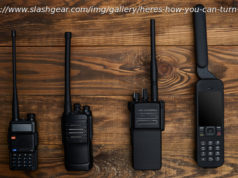Motorola’s new Moto Z3 really isn’t that exciting of a device on its own, but a new Moto Mod will add 5G connectivity to it. At the event in Chicago this week, we got to go hands on with both of them.
This week at an event in Chicago, Motorola announced its 2018 flagship handset, the Moto Z3. The only problem is that it’s not really a flagship by today’s standards, and it’s really just a sort of hybrid between last year’s Moto Z2 Force and this year’s Moto Z3 Play.
The one new feature that the Lenovo-owned firm announced isn’t even available yet. With the new 5G Moto Mod, the Z3 will be the first phone that will be upgradeable to 5G, when it’s available in 2019.
Let’s start with the phone itself, which seemed like a footnote during the announcement. Indeed, this felt more like a Verizon event to announce 5G.
Does this phone look familiar? It should. The body is almost identical to the Moto Z3 Play. Just like the mid-range predecessor, it has a 6.01-inch 1080×2160 Super AMOLED display, giving it an 18:9 aspect ratio. The screen is definitely better than what you’d get from something in the Moto G or Moto X lineups, but it’s the same quality as a Z3 Play, or even the 1440p 16:9 Super AMOLED Moto Z2 Force.
Like the Moto Z3 Play, the Z3 has a glass back. The one difference in the models of the two handsets is that the Play is Deep Indigo, while the Z3 is black. Unfortunately, this isn’t a Force model, so that glass isn’t shatterproof. Once again, the glass is being added for aesthetics, as it doesn’t offer any new functionality.
There’s no fingerprint sensor on the front anymore since the display is 18:9 now. After all, Motorola maintains the same footprint to maintain backward compatibility with Moto Mods. The fingerprint sensor is now on the right side (it also can’t be on the back, since that’s where Mods go), and there’s a power button on the left.
Honestly, it’s kind of an odd design choice, as the fingerprint sensor could have just been the power button.
The Moto Z3 includes a Qualcomm Snapdragon 835 chipset and dual 12-megapixel cameras, so internally, it’s just like a Moto Z2 Force. The good news is that you can grab one for just $480, so it’s actually a good deal.
And then there’s the 5G Moto Mod, which was the real star of the show. Motorola did promise that the Z3 will be the first phone to be able to use 5G; however, this Mod will eventually work on all Moto Z iterations, as long as they come from Verizon.
If you’re not familiar with the concept of Moto Mods, they’re plug-and-play accessories that snap onto the back of a Moto Z-series smartphone, and they connect through the series of pins that you see above. Aside from the 5G Mod, there’s one that adds a gaming controller, a 360-degree camera, an Alexa speaker, and much more.
As you can see, the 5G Moto Mod adds considerable thickness to the Z3, and it’s even thicker than the device itself. Naturally, I asked them why they didn’t just add 5G into the device, and the reason is that there just wasn’t room.
There are a couple of reasons why the Mod is as thick as it is. There are antennae along the sides of it, and in the stub sticking out of the top. They’re strategically placed as well, since putting your hand over an antenna would completely block the signal. 5G works with millimeter waves, which are high-frequency waves that don’t do well when traveling through objects. Because of that, there are antennae on all sides so that the device can get a signal no matter how you’re holding it.
The other reason that it’s so thick is because it holds a 2,000mAh battery. Unfortunately, that doesn’t mean more battery life for the user. It simply means that 5G uses more power and you’re going to need it. Remember, early 4G LTE devices sucked down power as well.
Both the device and the Mod will have a USB Type-C port, so yes, you can charge both separately. But what’s really cool is that you can also use the Mod to tether to a separate device. 5G will support speeds of up to 5Gbps, far surpassing most home internet speeds, so you might want to use it.
The 5G is powered by Qualcomm’s Snapdragon X50 5G modem. While it’s attached though, it won’t use the device’s Snapdragon X16 4G LTE modem that comes with the Snapdragon 835 chipset. If it uses 4G LTE, the 5G Moto Mod actually includes a Snapdragon X24 4G LTE modem, which can achieve speeds of up to 2Gbps.
Unfortunately, it’s still unclear when people will actually be able to use these technologies. Gigabit 4G LTE was promised a couple of years ago, and still, very few people actually have it. 5G will likely roll out quicker, but you’ll probably need a new plan from your carrier .
The Moto Z3 will arrive on Verizon next week for $480, but the 5G Moto Mod won’t show up until early 2019.






